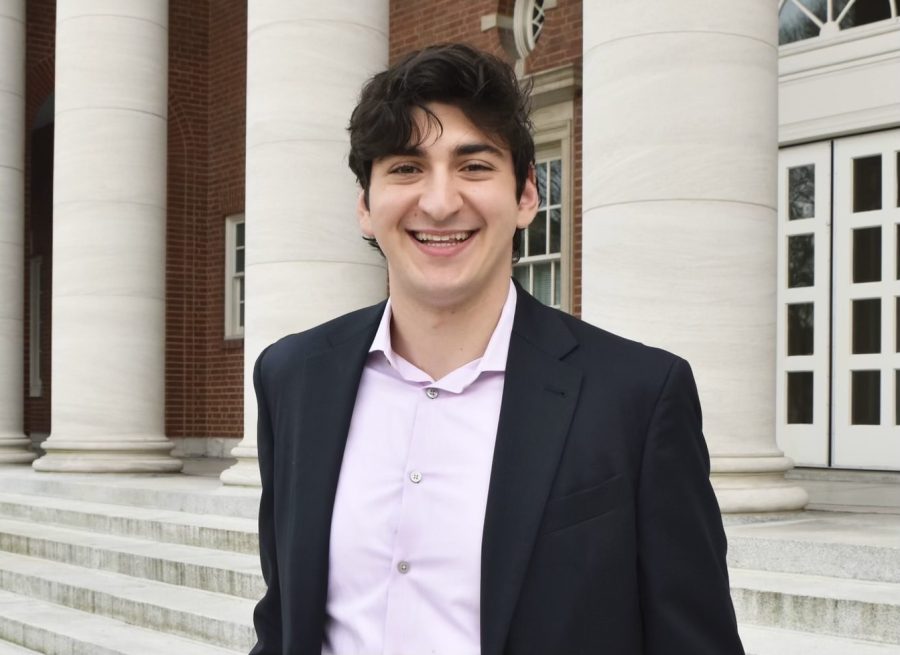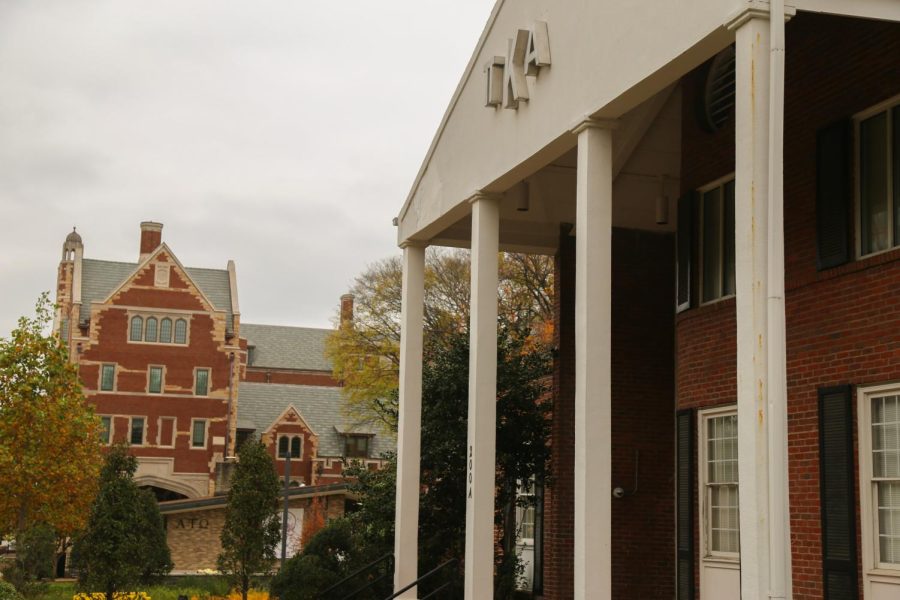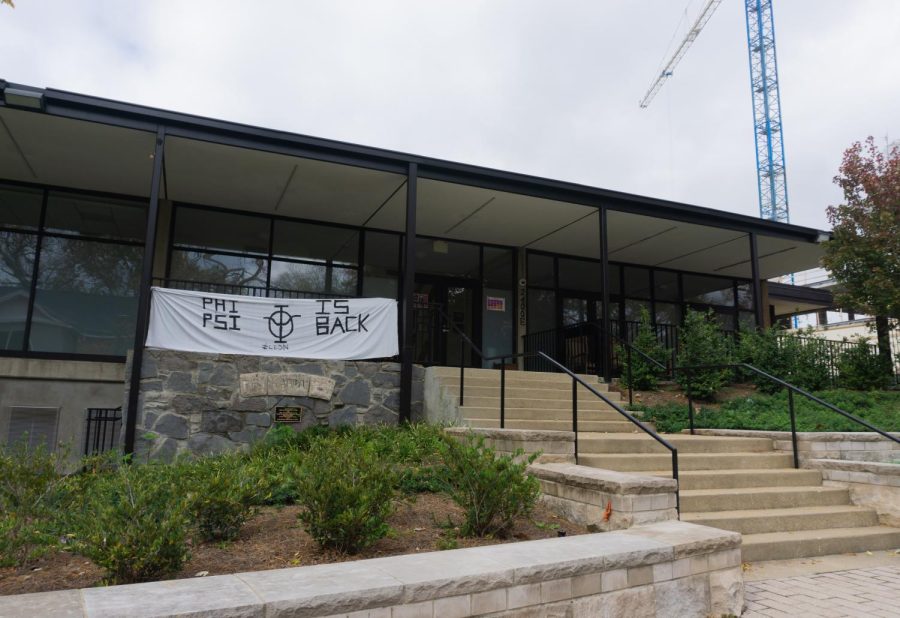UPDATED: A quote from alumna Alex Bettis has been added to show that her open letter was drafted in conjunction with a group of alumni.
Vanderbilt students call to abolish Interfraternity Council (IFC) and Panhellenic Council fraternities and sororities via social media. Hundreds of members reportedly disaffiliate.
According to Spring 2020 Size and Academic Membership Rankings, 763 students were involved in ten IFC fraternities and 1,389 students were involved in ten Panhellenic sororities.
The beginning and the foundation of the movement
A group chat began on June 28 with eight students who dropped their Greek organizations and grew over to around 400. At that point, it was deleted and broken down into separate group chats per former Panhellenic member Emma Pinto.
Pinto said that while she was one of the first people in the group chat she is not a leader within the movement.
Pinto, as well as other students, are calling the IFC and Panhellenic systems racist, patriarchal and elitist. She said that while she shielded herself under the guise of her “own supposed wokeness,” she realized that she could no longer financially support a large national organization that harms lower-income, BIPOC and LGBT+ communities on campus.
“The school is allowing Greek students to steal from other students under the guise of donations,” Pinto said. “This is awful, what we did by joining these organizations. Awful. We fucked up.”
Pinto also said that she was inspired to drop in part due to conversations with rising senior Kelsey Brown. Brown was never involved within a Greek organization but wrote in an email to The Hustler that she has long been vocal about her feelings that IFC and Panhellenic organizations are not safe spaces for BIPOC and LGBT+ communities. Brown said the Greek system was created as a tool of exclusion and added that the abolition of this tool does not necessitate replacement with a new social system on Vanderbilt’s campus.
“We need to ask the question where there are systems of care on our campus that we should foster and improve with the newly available spaces, houses and resources,” Brown said. “So many times have people justified their participation in an exclusionary, elitist, sexist and racist institution because of the friends they were able to make, which is understandable to an extent, but is also an incredible indicator of your privilege and ability to overlook and undersell your participation in an oppressive system.”
Brown added that she thinks those who believe in reform should take a long look at the Greek system as a whole. Brown said that individuals cannot be complicit in systems of oppression if they wish to earn their allyship.
Brown also shared that her friend Michaela Wiebe attempted to write an article for The Hustler in the spring of 2019 discussing the ways in which Greek life upholds systems of oppression, though after a series of edits it was never published.
“To me no matter the excuse or reason for not publishing her article, it was another form of being complicit,” Brown said.
Rising senior and former Panhellenic member Taylor Thompson echoed a similar sentiment to Pinto and Brown, saying that this movement does not involve NPHC or pre-business and law fraternities because they serve a different purpose and occupy a different space on campus. Thompson added that, while there are allies within the system, she believes that because the system is “an arm that promotes social capital,” it is beyond internal reform.
“Our sisters, our brothers aren’t the ones being harmed by our actions,” Thompson said. “The people who are being harmed by our actions are the ones that don’t have a voice at the table to say ‘Hey this is problematic.’”
The Vanderbilt chapter of the National Association for the Advancement of Colored People (NAACP) as well as Vanderbilt alumna Alex Bettis have posted open letters to Instagram calling for the abolition of Greek life on campus.
“It was an effort of many alumni (both of greek affiliation and not)—it really was a joint effort,” Bettis said in an email to The Hustler.
Social media in the movement
Madeleine Davis, rising junior, and Katherine Deegan, rising senior, were both dropped their Panhellenic sororities. Both have access to the @abolishvandyifcandpanhellenic Instagram account, formerly known as @abolishvandygreeklife. Davis and Deegan iterated that they are not the only ones with access to the account.
The account answers questions about the movement and posts submissions from students about why they feel the system should be abolished alongside stories of why students disaffiliated from their chapters. Davis stated that having a page serves as a way to gain visibility, and Deegan added that the account allows them to leave their Google Form open to receive submissions all the time. One Google Form specifically asks for feedback from non-Greek Vanderbilt students, while a separate form asks for feedback from Greek or formerly Greek students.
“We don’t want to center ourselves,” Davis said. “It’s not about us. At the end of the day, we screwed up by being in the system. This is not an ‘Oh wow, we’re so great because we’re abolishing Greek life, let’s get all this social clout for doing something good.’ No, this is not about us, we’re just doing what we can to get rid of the system and then we’re walking away.”
Cedoni Francis, B.A. 2020, used her Tik Tok account @cedonifrancis to speak on her experience within her Panhellenic sorority as well. Francis posted a four-part Tik Tok series entitled “Exposing sorority racism” starting on May 31 and told the story of her chapter’s contested presidential election as well as described an incident where a sister sang a racial slur in a song. Francis added that while she did not drop during her time at Vanderbilt, she did not elect to receive any of the alumni privileges and thus essentially revoked her status as a sister.
“Something that really frustrated me throughout my entire Vanderbilt experience is that because I am a person against racial injustice, and because I was a person who was involved in Panhellenic Greek life, a lot of White people looked at me as the voice of the Black people and expected me to teach them how to unlearn the things that they know,” Francis said. “I expended a lot of labor doing that when in actuality, I’m well-versed in the subject because I’m a Black woman, but there’s a whole office on campus for those things.”
Francis also added that both the racially-charged posts on GreekRank and the widely-circulated Instagram video of a white student using a racial slur were in no way shocking to her and that they demonstrated what she knew to be true already.
In response to the video, Vanderbilt emailed the student body on July 3 stating that the matter had been turned over to the Title IX and Student Discrimination Office for investigation. Later in a July 7 email, the university added that Vanderbilt University Public Safety contacted GreekRank, where the racist posts were removed. In an email containing the IFC statement for public release sent to The Hustler on July 10, The IFC condemned the GreekRank posts and called for a swift, independent investigation.
University, Panhellenic and IFC responses
Kristin Torrey, Director of Greek Life, wrote in an email to The Hustler that the Office of Greek Life (OGL) will support a Greek chapter of any size, and that no numeric threshold exists where a chapter would no longer be recognized. Torrey added that population numbers are taken every September and January, so she did not have any information regarding the most recent wave of disaffiliations. In addition, Torrey wrote that individuals do not disclose reasons for dropping their fraternity or sorority, so there is no statistical difference between a student who drops due to financial concerns versus a student who dropped as part of the abolition movement.
“With the passion and enthusiasm that students have for social justice issues, especially at this time, I think there is great opportunity for making substantive change,” Torrey wrote. “I am hopeful that there are students within the Greek community that will be a part of making change to reform as we know that there are serious issues that must be addressed. There are many stories related to Greek Life about students who have been retained at Vanderbilt when they otherwise wouldn’t have, who have been supported when they needed it most, and who found a place to belong as their authentic self. This does not excuse bad behavior, but I believe the Greek community can play a role in reform.”
Rising senior Christia Victoriano, President of the Panhellenic Council, said in an email to The Hustler that reform within the Panhellenic Council has been slow. However, she added that she became president because she felt supported by her chapter as a woman of color and wanted to advocate for inclusion within the community. Victoriano also stated that she, along with other chapter presidents, are currently discussing actionable items to address the movement’s concerns about systemic racism, classism and homophobia.
“Many of these reforms are different from those of the past because we are looking to remove deeply-rooted systemic barriers, such as recruitment practices that disadvantage women of color,” Victoriano said. “While specific plans have yet to be announced, some of our goals include restructuring the formal recruitment process, expanding and mandating anti-racist education, paying reparations through fundraising for anti-racist organizations and scholarships and striving to create community-wide mechanisms to hold individuals accountable for sexual assault.”
Rachel Rosenberg, former Panhellenic representative for the Greek Inclusivity Alliance, created a petition calling for the abolition of IFC and Panhellenic fraternities and sororities on campus. As of publication, the petition has over 800 signatures.
When contacted for comment, Vice President of Member Development for IFC Preston Hausser sent The Hustler a copy of the IFC’s statement. The statement includes a list of actions the community plans on taking to make IFC safer and more inclusive. The steps include future collaborations with Project Safe to create accountability systems, programming improvements, increases in facility access and a review of financial constraints.
“Alongside the current events in our nation, members of our student body have begun an extremely important conversation about our campus culture and the scourge of sexual violence, misogyny, racism, classism, homophobia, and transphobia perpetrated by members of the fraternity community,” the statement reads. “We acknowledge that in the past, Greek organizations have failed to adequately investigate and consider allegations made against fraternity members and remove them from our community. This is absolutely unacceptable and will no longer be tolerated in any form.”












Anonymous • Mar 29, 2021 at 3:14 pm CDT
The reasons I have seen described herein to justify the push to disband the fraternities and sororities at Vanderbilt University cite key word phrases such as: “deeply-rooted systemic barriers”; “recruitment practices that disadvantage women of color”; “incidences of racism, misogyny, classism, homophobia, transphobia, ableism, and sexual assault”; “discriminatory, harmful, and elitist practices”; “classist cost-barriers to entry”. The overreaching sentiment expressed is that these fraternal institutions encourage “a predominantly white, able-bodied, and cis-hetero demographic”.
While none of these descriptives would generally be considered admirable or positive traits to endorse, I still return to one basic premise. If you don’t agree with the tenets endorsed by an organization then why not simply choose not to seek admission into such organizations? The descriptive phrases you use to outline the practices and broad-reaching objectives of these institutions are quite subjective. Most are not necessarily founded in actual evidentiary actions; but rather in the subjective opinions of those who feel excluded for some reason or another. Those incidences that do violate viable statutes and personal liberties are punishable by law as they should be. While I agree that exclusionary practices are not ideal, I still maintain that upholding the values embraced by our Constitution- namely “freedom of choice” must be prioritized over the inclusionary, and some would say “Utopianistic” ideals of a few. Exclusionary mindsets only serve to hurt those who choose this path as they are the students who miss out on the cultural enhancements of diversity. Is it your responsibility to teach them a lesson by advocating that all choice be removed for consideration?
In short, if you don’t agree with the philosophies upon which Greek institutions were founded, then simply do not join!! Furthermore when these perceived exclusionary practices are described herein, I want to point out that most refer to issues surrounding affordability, race, and sexual preference. I am particularly bothered as it relates to issues of affordability. I ask myself, under what premise could one justify that all organizations should be available to all people? In what society is affordability to all the primary consideration for societal acceptance? The only answer which comes to my mind is “in a socialistic society”. As to issues of race, are there not greek institutions specifically created for black members? If so, do you propose that these institutions also be disbanded? As to sexual preference or gender identity, are there not organizations on campus for students who wish to join like-minded fellow students who share in a similar mindset of sexual preference? If so, will these institutions also cease to be endorsed and mandated for cessation? What benefit is gained by eliminating organizations of any type that organize like-minded individuals into a formal group for reasons of socialization and community service?
The problem I see here is not steeped in racism nor is it truly about acceptance of various sexual preferences; but rather issues of affordability under the broader headings of “inclusivity” and “entitlement” Inclusivity is defined as “the practice or policy of providing equal access”. Anyone can choose to apply for admission into any of the sororities or fraternities of his/her liking; so equal access is clearly offered in the Greek System admission process. Specifically, however, affordability is not a parameter in the definition of Inclusivity. America is a capitalistic nation – not a socialistic country. Perhaps those who harbor feelings of exclusion, simply because they cannot afford to join one of these institutions, should reconsider their personal objectives. Namely, why would you want to be a part of a group of wealthy students if you do not have similar background experiences, life goals, or mutual value systems? Instead seek out another organization whose members do share many of the values you hold dear. By trying to eliminate the “freedom of choice” for others for whatever reasons you deem to be unequal, in essence you also eliminate such freedoms for yourself.
I understand and admire your goals to change societal perceptions but history has taught us that is not best undertaken through enforcement but rather by swaying the popular opinion. Instead of eliminating all choices, opt instead to work to become the desired choice. Perhaps one day, straight students will choose to join a homosexual organization; or black students will prefer to join these traditionally white fraternal organizations you describe.
Perhaps you use your energy to focus less on what others have and more on what you wish to attain; which, from what I can surmise, is a society exclusive of racial, sexual or socio-economic differences? Perhaps you can persuade others to join you in your fight to become a homogenous society devoid of individual identity parameters. More power to you in actualizing your goal; but not at the expense of that which allows you to make this argument – the fact that you live in a country that embraces freedom of speech and freedom of choice for ALL. In my personal opinion, it is the very notion of diverse ethnicities and backgrounds that make this country so great; not overreaching government and institutional mandates that FORCE others to accept a certain mindset or value system.
A forced prioritization on a certain set of ideals by eliminating all other choices only serves to perpetuate the very exclusionary ideals you disavow. The only difference is the tenets being mandated are your own and that is the very definition of entitlement – “the belief that one is inherently deserving of privileges or special treatment.” By further embracing and promulgating these ideals of entitlement for those you perceive to be marginalized, you only serve to substantiate an exclusionary mindset as opposed to focusing more on the inherent beauty in a diverse humanity. Choose instead to focus on the advantages that social and ethnic diversities bring to those who choose to open their minds and subscribe less to the advancement of the “me” mentality. Think of the whole of “humankind” and less on the sum of its parts.
concerned with your comment • Dec 27, 2023 at 6:02 am CST
your comment is concerning. “dont join if you dont like it”. That kinda nonsense thinking is why the Nazi party still exists. It’s why terrorist groups like Boko Haram and the KKK still exist. Re-focus and re-frame please. Diversity is best, a comment on which I think we agree. Also agree that the Greek system is not inherently problematic – the members itself do or do not make it problematic. When SAE’s assault women, that’s a freakin’ problem. Period. That’s the point of the Abolish movement (in case unclear). Have a great day!
David A. King • Jan 31, 2021 at 3:08 pm CST
Given that everyone that goes to Vandy these days is among the elite (or at least the elite in waiting) I find it very funny that any Vandy student complains about something being elitist. Essentially this is the “woke folks” feeling that they need to shove their viewpoints down the throats of everyone else – kind of like insurrectionists on January 6. BA ’74 and Beta.
Steve Rogers • Jul 22, 2020 at 7:37 am CDT
The real story here is the organized effort across multiple campuses. A quick google will see that this is not a local thing, and that strings are being pulled on a national basis. Puppets.
Tony Stark • Jul 21, 2020 at 2:20 pm CDT
The irony here is that this attempt to destroy a supposed system of social capital is rooted in a desire for social capital. Those who “don’t center themselves” are only paving the way for those who will center themselves. There is no way to disprove an allegation of systemic racism or systemic anything; it theoretically exists everywhere and in everyone, so no solution will be adequate. The majority who don’t want “clout” will be dominated by the selfish minority who do in a never-ending stream of accusation. Instead of blaming the system, why not actively make connections with people different from yourself? Movements by themselves can’t make Vanderbilt kinder, only individuals can.
Jake • Jul 21, 2020 at 11:42 am CDT
These vague gestures at reforms by IFC and PanHel leaders is pathetic in the face of the profound and wrenching testimony of victims of the violence inherent in the Greek system. You cannot reform that which is founded on the principle of exclusion and reproduction of power for the already privileged. If reform is intended to expand the diversity of those who receive that privilege and mask the violence of the system under a layer of ineffective “anti-racism training,” then it will achieve its goal. If it is intended to actually move an unjust system towards justice, you’d have better luck taking the moon out of orbit.